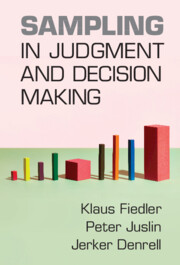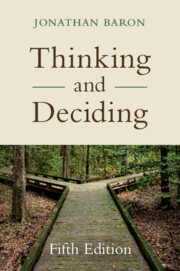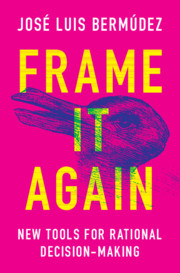Sampling in Judgment and Decision Making
$155.00 (F)
- Editors:
- Klaus Fiedler, Universität Heidelberg
- Peter Juslin, Uppsala Universitet, Sweden
- Jerker Denrell, University of Warwick
- Date Published: June 2023
- availability: Available
- format: Hardback
- isbn: 9781316518656
$
155.00
(F)
Hardback
Other available formats:
Paperback, eBook
Looking for an examination copy?
If you are interested in the title for your course we can consider offering an examination copy. To register your interest please contact [email protected] providing details of the course you are teaching.
-
Sampling approaches to judgment and decision making are distinct from traditional accounts in psychology and neuroscience. While these traditional accounts focus on limitations of the human mind as a major source of bounded rationality, the sampling approach originates in a broader cognitive-ecological perspective. It starts from the fundamental assumption that in order to understand intra-psychic cognitive processes one first has to understand the distributions of, and the biases built into, the environmental information that provides input to all cognitive processes. Both the biases and restriction, but also the assets and capacities, of the human mind often reflect, to a considerable degree, the irrational and rational features of the information environment and its manifestations in the literature, the Internet, and collective memory. Sampling approaches to judgment and decision making constitute a prime example of theory-driven research that promises to help behavioral scientists cope with the challenges of replicability and practical usefulness.
Read more- Provides a comprehensive account of almost all important novel developments in the field
- Offers a timely contribution to this branch of rationality research
- Diverse in content, methodology, discipline, sub-discipline, affiliation, nationality, gender, and academic culture
Reviews & endorsements
‘Inferences depend heavily on what information is sampled. With chapters by leading sampling researchers, this book provides a fascinating overview of the innovative work done on this topic over recent decades. Sample these chapters to gain insights into how our minds work.’ Robin Hogarth, Barcelona School of Economics and Universitat Pompeu Fabra, Spain
See more reviews‘There has been a revolution in cognitive and social psychology. The conventional view on rationality, which locates the causes of poor choices and judgments in the human mind, is being replaced with the view that the properties of informational samples go a long way to explain the successes and the failures of rational and irrational thinkers alike. A massive fundamental attribution error, committed by psychological science, is thus being corrected. This masterly volume, edited by Fiedler, Juslin, and Denrell, is a progress report and a manifesto of hard-nosed scientific progress.’ Joachim I. Krueger, Brown University, USA
‘This book makes a compelling case that we can greatly enrich our understanding of human judgment and decision making if we focus on how we sample information from environments that often seem deliberately designed to confuse or mislead us.’ Barbara Mellers, University of Pennsylvania, USA
Customer reviews
Not yet reviewed
Be the first to review
Review was not posted due to profanity
×Product details
- Date Published: June 2023
- format: Hardback
- isbn: 9781316518656
- length: 520 pages
- dimensions: 235 x 158 x 36 mm
- weight: 0.98kg
- availability: Available
Table of Contents
1. The theoretical beauty and fertility of sampling approaches: a historical and meta-theoretical review Klaus Fiedler, Peter Juslin and Jerker Denrell
2. Homo ordinalus and sampling models: the past, present, and future decision by sampling Gordon D. A. Brown and Lukasz Walasek
3. In decisions from experience what you see is up to your sampling of the world Timothy J. Pleskac and Ralph Hertwig
4. The hot stove effect Jerker Denrell and Gaël Le Mens
5. The J/DM separation paradox and the reliance on small samples hypothesis Ido Erev and Ori Plonsky
6. Sampling as preparedness in evaluative learning Mandy Hütter and Zachary Adolph Niese
7. The dog that didn't bark: Bayesian approaches to reasoning Brett K. Hayes, Saoirse Connor Desai, Keith Ransom and Charles Kemp
8. Unpacking intuitive and analytica memory sampling in multiple-cue judgment August Collsiöö, Joakim Sundh and Peter Juslin
9. Biased preferences through exploitation Chris Harris and Ruud Custers
10. Evaluative consequences of sampling distinct information Hans Alves, Alex Koch, and Christian Unkelbach
11. Information sampling in contingency learning: sampling strategies and their consequences for (pseudo-)contingency Franziska M. Bott and Thorsten Meiser
12. The collective hot stove effect Gaël Le Mens, Balázs Kovác, Judith Avrahami, and Yaakov Kareev
13. Sequential decisions from sampling: inductive generation of stopping decisions using instance-based learning theory Cleotilde Gonzales and Palvi Aggarwal
14. Thurstonian uncertainty in self-determined judgment and decision making Johannes Prager, Klaus Fiedler, and Linda McCaughey
15. The information cost-benefit trade-off as a sampling problem in information search Linda McCaughey, Johannes Prager, and Klaus Fiedler
16. Heuristic social sampling Thorsten Pachur and Christin Schulze
17. Social sampling for judgments and predictions of societal trends Henrik Olsson, Mirta Galesic and Wändi Bruine de Bruin
18. Group-motivated sampling: from skewed experiences to biased evaluations Yrian Derreumaux, Robin Bergh, Marcus Lindskog and Brent Hughes
19. Opinion homogenization and polarization: three sampling models Elizaveta Konovalova and Gaël Le Mens
20. An introduction to psychologically plausible sampling schemes for approximating Bayesian inference Jian-Qiao Zhu, Nick Chater, Pablo León-Villagrá, Jake Spicer, Joakim Sundh and Adam Sanborn
21. Approximating Bayesian inference through internal sampling Joakim Sundh, Adam Sanborn, Jian-Qiao Zhu, Jake Spicer, Pablo León-Villagrá and Nick Chater
22. Sampling data, beliefs, and actions Erik Brockbank, Cameron Holdaway, Daniel Acosta-Kane, and Edward Vul.
Sorry, this resource is locked
Please register or sign in to request access. If you are having problems accessing these resources please email [email protected]
Register Sign in» Proceed
You are now leaving the Cambridge University Press website. Your eBook purchase and download will be completed by our partner www.ebooks.com. Please see the permission section of the www.ebooks.com catalogue page for details of the print & copy limits on our eBooks.
Continue ×Are you sure you want to delete your account?
This cannot be undone.
Thank you for your feedback which will help us improve our service.
If you requested a response, we will make sure to get back to you shortly.
×



